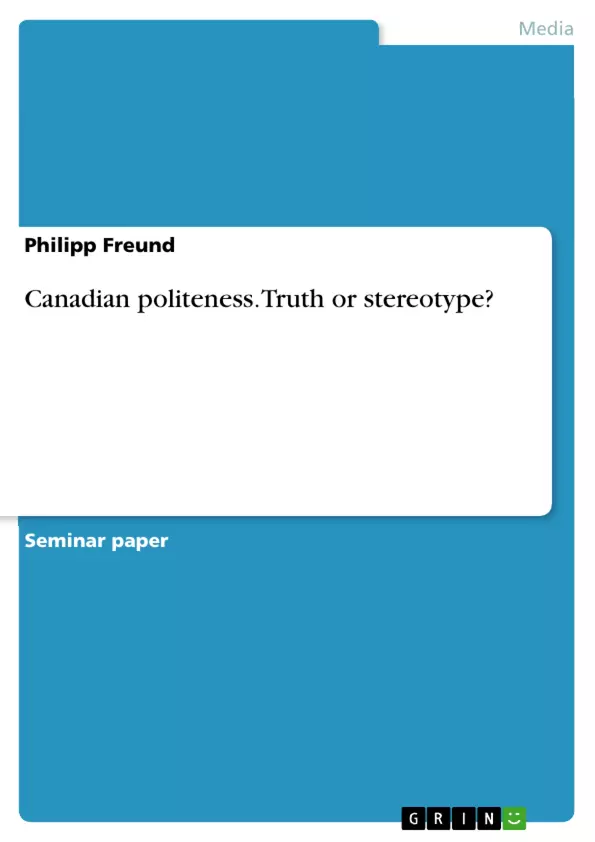“Is Our Politeness Holding us Back” (Souvaliotis 2011)? This very title indicates a major concern about language. The author is thinking about Canada which is stereotypically said to be the politest countries in the world. Or, like the novelist Bissoondath put it in: “We are a country of good heart, a country on the whole of courage and goodwill […]” (2006: 25). Souvaliotis continues and analyzes that Canadians voice their “concerns so gently packaged and tightly buried in their talk that most listeners would naturally smile” (2011).
Scientifically, this prejudice seems to be incredible, which is why this paper needs to be written. The title and research question, hence, can be stated as “Canadian Politeness – A never-ending stereotype or just the truth about the friendliest country?” and should outline whether Canadians are more polite than others and if so, why. The hypothesis states in fact a more kindly and friendly way of speaking, though, it just occurs in a sense of habit and not manner.
Table of Contents
- Introduction
- Theoretical and Historical Background
- An Attempt of Defining Politeness
- Conversation Analysis and Politeness
- Parameters in a Communication Situation
- Methodology
- Analyses and Results
- Twitter Dialogue Canada
- Twitter Dialogue USA
- Discussion
- Conclusion
Objectives and Key Themes
This paper investigates the common stereotype that Canadians are exceptionally polite. It aims to analyze the validity of this perception through the lens of conversation analysis, focusing specifically on Twitter dialogues. The study explores the language used in Canadian and American social media interactions to determine if any notable differences exist in terms of politeness.
- The historical and cultural context of Canadian politeness
- The role of language in shaping national identity
- The application of conversation analysis in analyzing politeness
- Comparative analysis of politeness in Canadian and American online discourse
- The implications of politeness on communication and social interactions
Chapter Summaries
- Introduction: The introduction establishes the research question, "Canadian Politeness - A never-ending stereotype or just the truth about the friendliest country?" It introduces the common stereotype of Canadian politeness and its potential implications on how Canadians communicate. This section also outlines the research methodology and the use of two Twitter dialogues as primary sources.
- Theoretical and Historical Background: This chapter delves into the historical and cultural background of Canadian politeness. It explores the influence of British and French colonialism, highlighting the historical bond between Canada and Britain. The chapter also analyzes the impact of these historical influences on the development of Canadian English and its potential connection to politeness.
- Methodology: This chapter details the methodology used for the research. It focuses on the application of conversation analysis to analyze Twitter dialogues. The section discusses the parameters and criteria used to identify polite and impolite language within these social media conversations.
- Analyses and Results: This chapter presents the analysis of the two selected Twitter dialogues, one from Canada and one from the USA. The analysis focuses on identifying and comparing instances of polite and impolite language usage within these dialogues. The chapter aims to reveal potential differences or similarities in communication styles between Canadians and Americans.
- Discussion: This chapter interprets the findings from the Twitter dialogue analyses. It discusses the significance of any observed differences or similarities in communication styles, and explores their potential connection to the stereotype of Canadian politeness. This section aims to draw conclusions based on the empirical data and link them back to the theoretical framework.
Keywords
The primary keywords and focus topics include: Canadian politeness, conversation analysis, Twitter dialogues, national identity, language attitudes, Canadian English, British influence, French influence, communication styles, online discourse.
Frequently Asked Questions about Canadian Politeness
Is Canadian politeness a real trait or just a stereotype?
This paper investigates whether the perception of Canadians as exceptionally polite is a factual truth or a never-ending stereotype using conversation analysis.
How was the politeness of Canadians analyzed in this study?
The study utilized conversation analysis of social media interactions, specifically comparing Twitter dialogues from Canada and the USA.
What historical factors influenced Canadian politeness?
The research explores the influence of British and French colonialism and the historical bond between Canada and Britain on language and behavior.
What is the hypothesis regarding Canadian speech patterns?
The hypothesis states that while Canadians may have a more kindly way of speaking, it often occurs as a matter of habit rather than intentional manner.
Does politeness impact Canadian national identity?
Yes, the paper explores how language attitudes and communication styles like politeness help shape national identity.
- Quote paper
- B.A. Philipp Freund (Author), 2017, Canadian politeness. Truth or stereotype?, Munich, GRIN Verlag, https://www.hausarbeiten.de/document/376894


